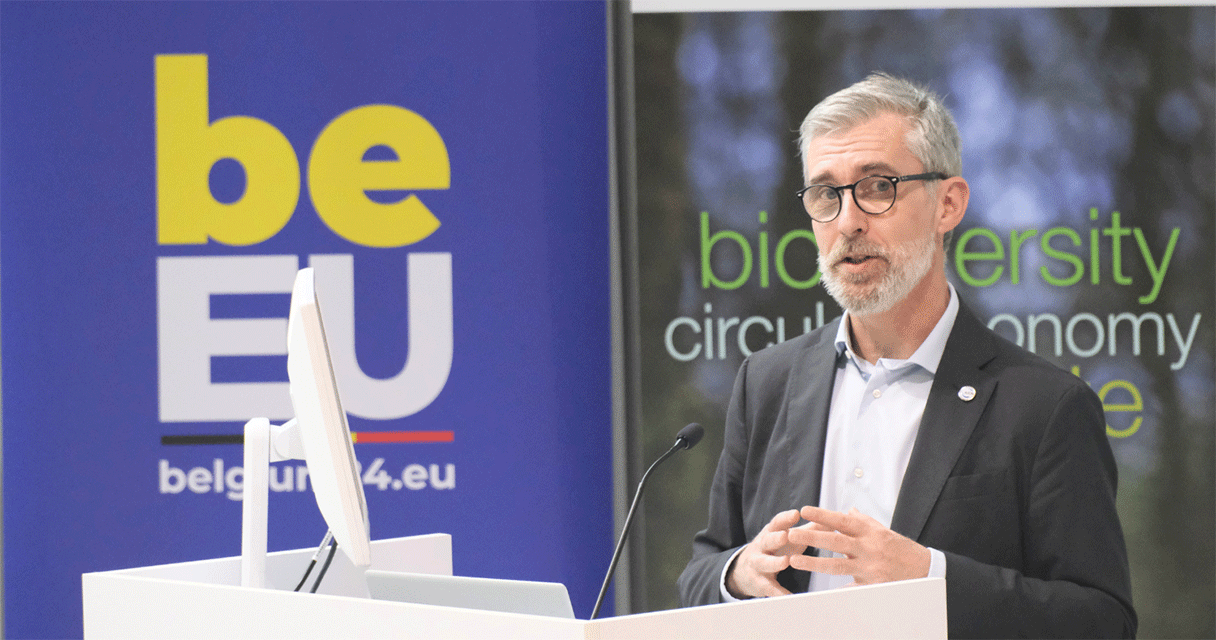Thriving Territories: The potential of Nature-based Solutions
On April 29, 2024, the IUCN European Regional Office, in collaboration with the Belgian EU Presidency and Brussels Environment, convened an event titled "Thriving Territories: The potential of Nature-based Solutions" at BEL Brussels, Avenue du Port 86C, 1000 Brussels. This event, sponsored by Brussels Environment, is a traditional IUCN collaboration with each Council Presidency. It consisted of a roundtable discussion followed by an informal reception, bringing together key stakeholders in European decision-making to delve into holistic conversations concerning climate change and biodiversity challenges.
This edition's theme reflected the Belgian Presidency's three priorities: Adaptation and Resilience, Circular Economy, and Just Transition. The event kicked off with the launch of high-level prospective studies outlining the challenges and potential of Nature-based Solutions, endorsed by EU regulations and strategies across multiple sectors beyond the environment. Drawing from this premise, the panels provided insights to enhance the ongoing discussion regarding the 8th Environmental Action Plan, thus playing a pivotal role in shaping the future environmental agenda of the European Commission.
Barbara Dewulf, Director General ad interim, Brussels Environment, representing Minister Alain Maron, extended a warm welcome to all attendees, introducing the evening's speakers and expressing gratitude to the participating organisations.
"Nature is a key ally in achieving numerous objectives, particularly Nature-based Solutions aimed at fulfilling the three goals of the Belgian Presidency: Adaptation and resilience, Just Transition, and Circular Economy," she emphasised.
Boris Erg, Director of the European Regional Office at the International Union for Conservation of Nature, underscored the event's significance in broadening its scope. He traced the inception of Nature-based Solutions back to the 2020 Nature Convention, highlighting the subsequent establishment of standards and supporting tools. Boris emphasised the importance of disseminating this invaluable tool to facilitate a just transition, inviting participation in the Regional Conservation Forum in September.
The event encompassed two thematic sessions: "From trade-offs to co-benefits" and "Challenges of a just urban transition."
In the first session, Clara Van Holm from Sphère Avocats stressed the importance of studying the synergies between biodiversity preservation strategies and urban policies. Drawing on examples like vegetal walls, she highlighted Nature-based Solutions' role in promoting health, wellbeing, and nature. Ensuring a clear definition of Nature-based Solutions and fostering coherence across policies emerged as pivotal. Alberto Arroyo Schnell from the International Union for Conservation of Nature explored the links between Circular Economy and Nature-based Solutions, advocating for their synergy to achieve environmental targets.
The audience posed several questions, touching upon the involvement of landscape architects in decision-making processes, the integration of Nature-based Solutions into the Nature Restoration Law, and strategies to engage political actors.
In the second thematic session, Ine Vandecasteele from the European Environment Agency presented the findings of the Urban Adaptation in Europe: What works? report. The report identified 36 climate risks demanding urgent action across various sectors, underlining the effects of climate change on urban environments. Priority sectors and enabling factors for resilience were delineated, alongside strategies for mainstreaming and upscaling adaptation efforts.
Roselyne de Lestrange from Brussels Environment presented a concrete example of Multifunctional Shared Urban Landscapes, exemplifying Nature-based Solutions in action. The Sennette Park project in Anderlecht illustrates the potential of integrating Nature-based Solutions into urban planning, emphasising community engagement and sustainability.
In addressing questions from the audience, speakers emphasised the importance of collaboration, financial sustainability, and knowledge-sharing to enhance funding accessibility and achieve coherence in implementing Nature-based Solutions.
In closing, Ms. Ewa Malz, Head of Unit at the Environment Department of the European Commission, reflected on the future role of the 8th Environment Action Programme.
Challenges abound in implementing Nature-based Solutions, and garnering attention for these solutions is paramount.
As Albert Einstein aptly noted, "The world as we have it is the process of our thinking; we cannot change it unless we change our thinking."
The European Green Deal embodies this shift in mindset, spurred by movements like Fridays for Future. Despite obstacles, Europe stands poised to lead the transition towards a greener, more sustainable future, drawing inspiration from exemplary initiatives and embracing innovation with confidence.




